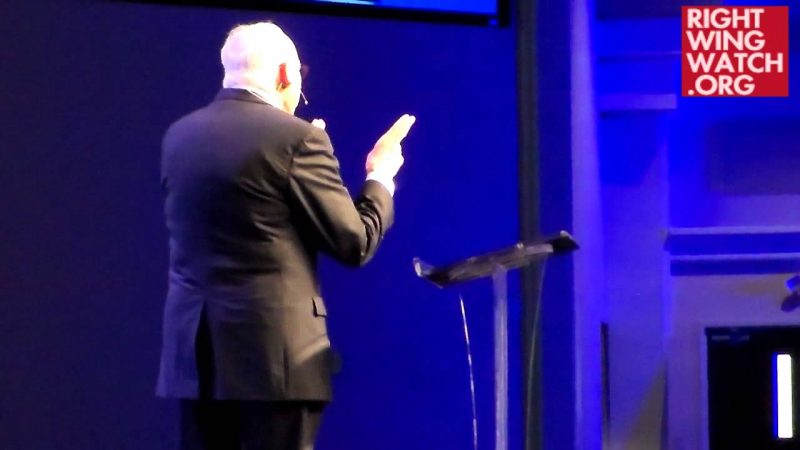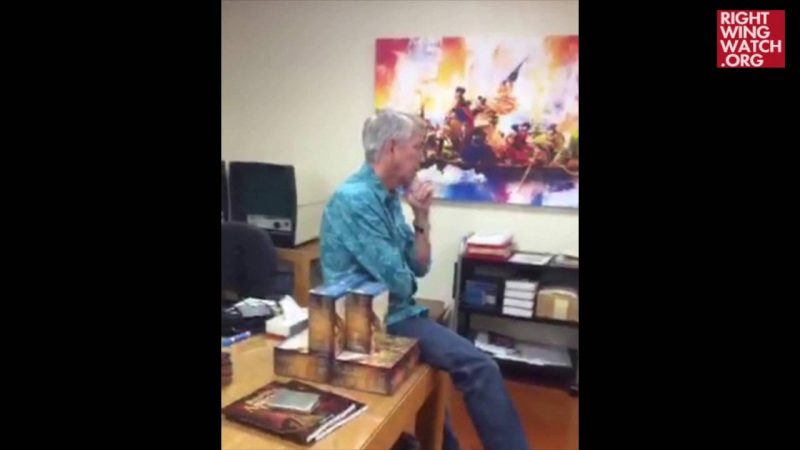Back in April, it was reported that David Barton had been appointed to serve on the Texas State Board of Education’s “panel of experts” tasked with examining the state’s social studies curriculum.
At the time, Barton made is clear that his goal was to ensure that the standards better reflected his right-wing views regarding our nation’s history, especially as it pertained to the issue of religion, but vowed to be so thoroughly accurate that nobody would be able to question his biased recommendations:
Barton expects outside groups to “holler and scream” about his recommendations to fix those errors due to the fact that he is a Christian and a conservative. But he adds that he and other members of the panel will give recommendations that are so historically accurate that board members will have a hard time refuting them.
Needless to say, it came as no surprise that when Barton unveiled his recommended changes [PDF], it contained a heavy focus on the need to teach students about the religious aspects of the nation’s history:
Understanding American Government. Students [Grade 5 (a)(1), (b)(16)] are told to “identify the roots of representative government in this nation as well as the important ideas in the Declaration of Independence,” but nowhere are those ideas specifically identified. Students should be familiar with the fundamental principles of America government set forth in the 126 words in the first three sentences at the beginning of the Declaration and those principles should be regularly reviewed throughout their tenure as a student:
When in the course of human events, it becomes necessary for one people to dissolve the political bands which have connected them with another, and to assume among the powers of the earth the separate and equal station to which the laws of nature and of nature’s God entitles them, a decent respect to the opinions of mankind requires that they should declare the causes which impel them to the separation.
We hold these truths to be self-evident, that all men are created equal, that they are endowed by their Creator with certain unalienable rights, that among these are life, liberty and the pursuit of happiness. That to secure these rights, governments are instituted among men, deriving their just powers from the consent of the governed.
(It is from this section that students are to recite by memory under state law.)
The principles set forth here and subsequently secured in the Constitution and Bill of Rights include:
1. There is a fixed moral law derived from God and nature
2. There is a Creator
3. The Creator gives to man certain unalienable rights
4. Government exists primarily to protect God-given rights to every individual
5. Below God-given rights and moral law, government is directed by the consent of the governedStudents must also understand the Framers’ very explicit (and very frequent) definition of inalienable rights as being those rights given by God to every individual, independent of any government anywhere (as John Adams explained, inalienable rights are those rights that are “antecedent to all earthly government; rights [that] cannot be repealed or restrained by human laws; rights [that are] derived from the Great Legislator of the Universe”). The inalienable rights specifically listed in the Declaration include those of life, liberty, and property, and the Bill of Rights subsequently identified other inalienable rights, including freedoms of religion, press, speech, assembly, and petition; the right of self-defense; the sanctity of the home; and due process. Each of these rights is to remain beyond the scope of government and is to be protected inviolable by government. These fundamental five precepts of American government must be thoroughly understood by students, but they are not currently addressed in the TEKS.
This is standard procedure for Barton: claiming that he is merely explaining history while focusing entirely on promoting his claims that American was fundamentally designed to be a Christian nation.
In fact, he has more or less admitted that to ABC News:
David Barton, president of the Texas-based Christian heritage advocacy group WallBuilders, is another expert on the panel who would like to see changes made to the school curriculum.
“I think there should be more of an emphasis on history in the social studies curriculum,” Barton said. “If there is an emphasis on history, there will be a demonstration of religion.”
…
Barton told ABCNews.com that he believes Texas’ public school curriculum should “reflect the fact that the U.S. Constitution was written with God in mind.”
And this is exactly the sort of result one would expect when a biased pseudo-historian like Barton is appointed to a “panel of experts” tasked with evaluating public school curriculum.








